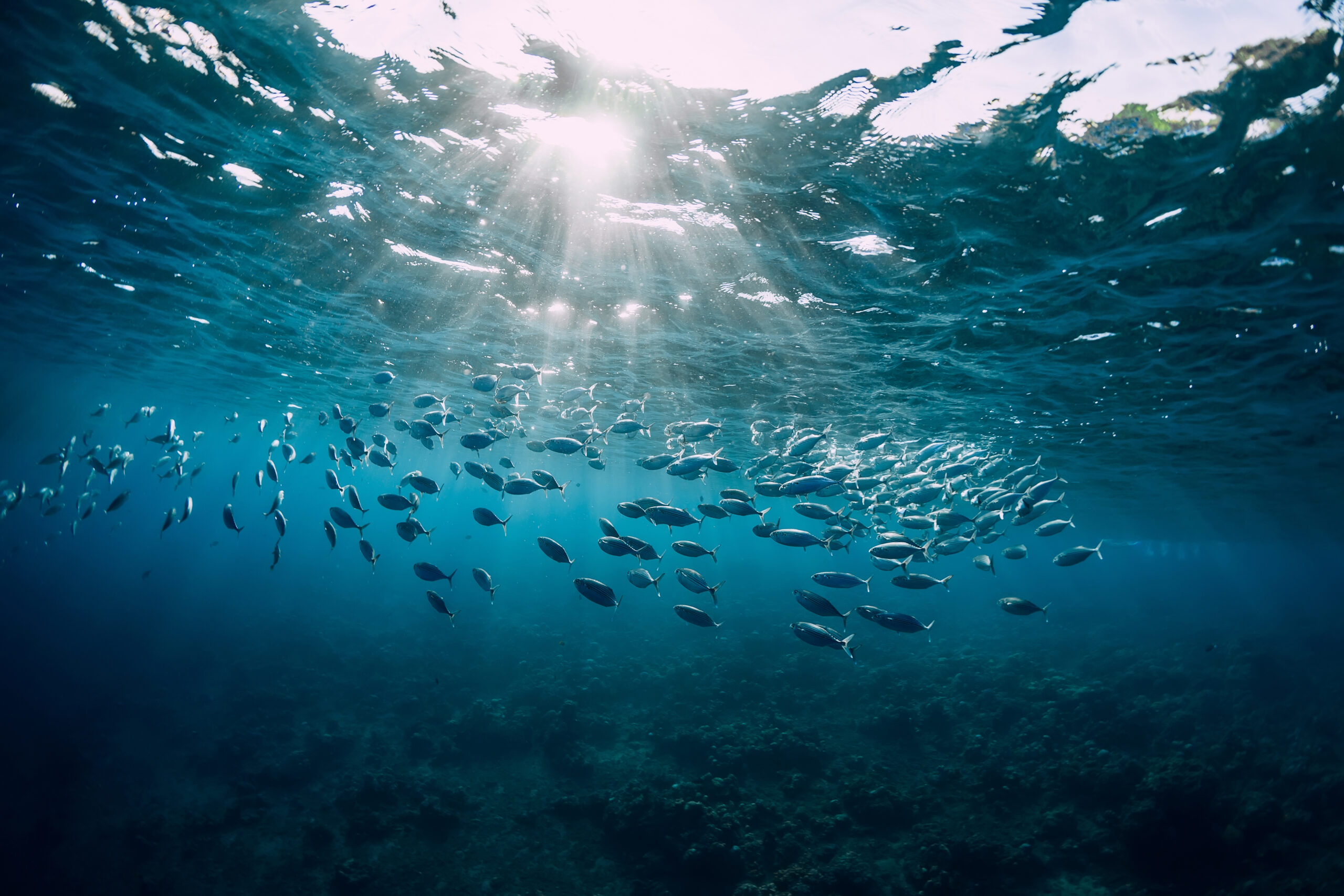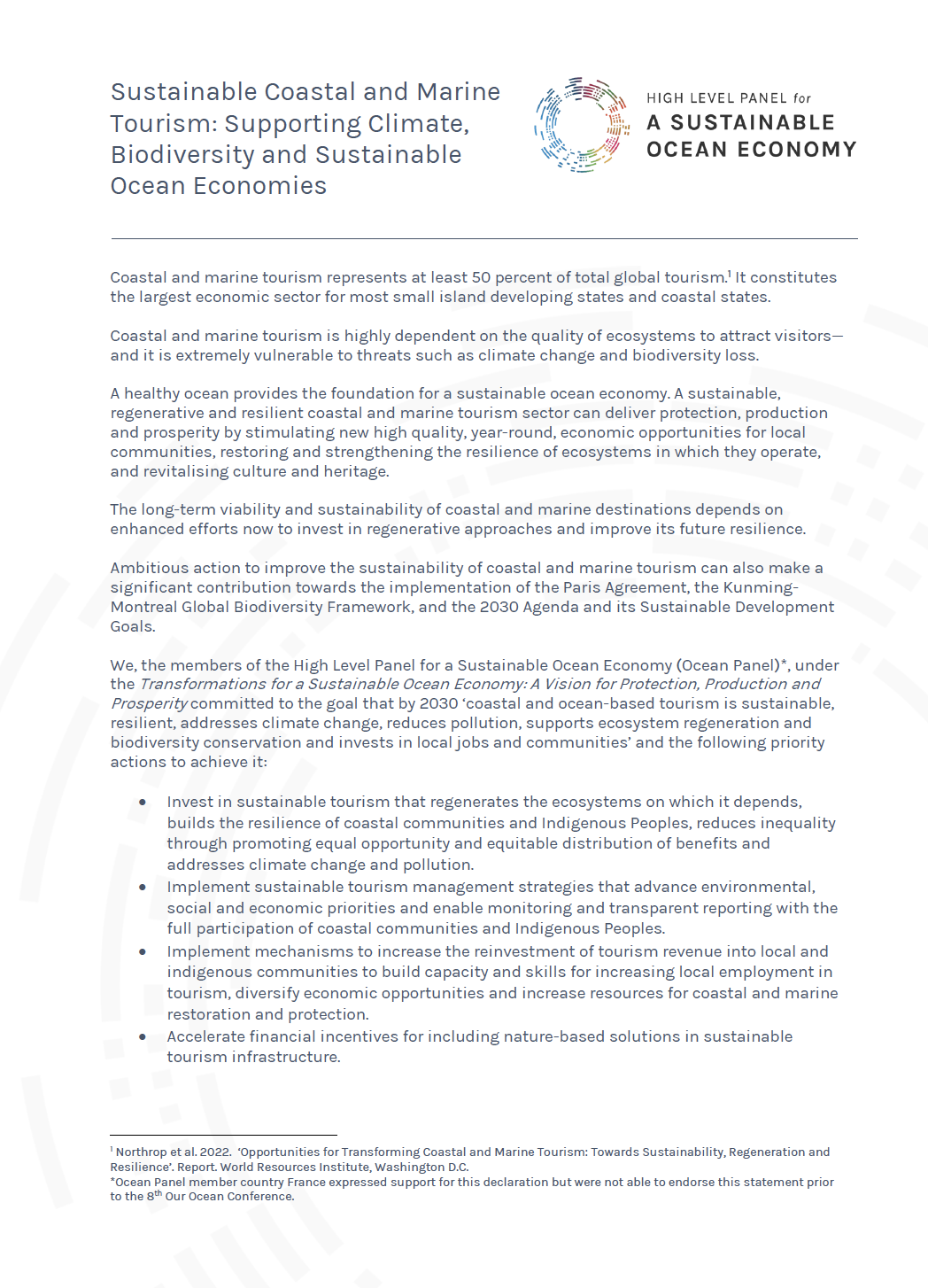El turismo costero y marino representa al menos el 50 por ciento del turismo mundial total.1 Constituye el sector económico más grande para la mayoría de los pequeños estados insulares en desarrollo y estados costeros.
El turismo costero y marino depende en gran medida de la calidad de los ecosistemas para atraer visitantes, y es extremadamente vulnerable a amenazas como el cambio climático y la pérdida de biodiversidad.
Un océano saludable sienta las bases para una economía oceánica sostenible. Un sector de turismo costero y marino sostenible, regenerativo y resiliente puede brindar protección, producción y prosperidad al estimular nuevas oportunidades económicas de alta calidad durante todo el año para las comunidades locales, restaurar y fortalecer la resiliencia de los ecosistemas en los que operan y revitalizar la cultura y la herencia.
La viabilidad y sostenibilidad a largo plazo de los destinos costeros y marinos depende de los mayores esfuerzos ahora para invertir en enfoques regenerativos y mejorar su resiliencia futura.
La acción ambiciosa para mejorar la sostenibilidad del turismo costero y marino también puede contribuir significativamente a la implementación del Acuerdo de París, el Marco Global de Biodiversidad Kunming-Montreal y la Agenda 2030 y sus Objetivos de Desarrollo Sostenible.
Nosotros, los miembros del Panel de Alto Nivel para una Economía Oceánica Sostenible (Panel Oceánico)*, bajo el Transformaciones para una economía oceánica sostenible: una visión para la protección, la producción y la prosperidad comprometido con el objetivo de que para 2030 "el turismo costero y oceánico sea sostenible, resiliente, aborde el cambio climático, reduzca la contaminación, apoye la regeneración de ecosistemas y la conservación de la biodiversidad e invierta en empleos y comunidades locales" y las siguientes acciones prioritarias para lograrlo:
- Invertir en un turismo sostenible que regenere los ecosistemas de los que depende, desarrolle la resiliencia de las comunidades costeras y los pueblos indígenas, reduzca la desigualdad mediante la promoción de la igualdad de oportunidades y la distribución equitativa de los beneficios y aborde el cambio climático y la contaminación.
- Implementar estrategias de gestión del turismo sostenible que promuevan las prioridades ambientales, sociales y económicas y permitan el monitoreo y la presentación de informes transparentes con la plena participación de las comunidades costeras y los Pueblos Indígenas.
- Implementar mecanismos para aumentar la reinversión de los ingresos del turismo en las comunidades locales e indígenas para desarrollar la capacidad y las habilidades para aumentar el empleo local en el turismo, diversificar las oportunidades económicas y aumentar los recursos para la restauración y protección costera y marina.
- Acelerar los incentivos financieros para incluir soluciones basadas en la naturaleza en la infraestructura turística sostenible.
- Invertir en infraestructura de alcantarillado y aguas residuales para el turismo costero y marino para mejorar la salud de las comunidades costeras y reducir los impactos en los ecosistemas costeros y marinos.
Para apoyar una aceleración del progreso en estas acciones prioritarias, el Panel encargó un informe de expertos sobre turismo oceánico, Oportunidades para Transformar el Turismo Costero y Marino: Hacia la Sostenibilidad, la Regeneración y la Resiliencia. Como miembros del Ocean Panel, hacemos un llamado a los gobiernos y a las partes interesadas del sector del turismo marino y costero para promover:
- Mayor cooperación y colaboración. Todos en el sector del turismo tienen un papel que desempeñar, incluido el apoyo a asociaciones genuinas que brindan oportunidades para el liderazgo de las comunidades locales.
- Un asiento en la mesa. Garantizar que el turismo se integre en las agendas de los océanos, el clima y la biodiversidad y en las plataformas internacionales pertinentes.
- Acción sobre el cambio climático. Acelerar los esfuerzos para reducir las emisiones en todo el sector del turismo y alinearse con el objetivo de temperatura del Acuerdo de París y mantener al alcance un 1,5oC límite al aumento de la temperatura, incluso a través de la colaboración con países y actores e iniciativas no estatales relevantes, como la Declaración de Glasgow sobre la Acción Climática en el Turismo.
- Turismo positivo para la naturaleza. Utilizar soluciones basadas en la naturaleza para mejorar la resiliencia del turismo costero y marino y asegurar la alineación con el Marco Global de Biodiversidad de Kunming-Montreal.
- Inversión para apoyar la transformación. Para financiar una transformación positiva del turismo, será necesario revisar las estructuras financieras y de incentivos existentes y muchos destinos requerirán nuevos mecanismos financieros innovadores y sostenibles, incluida la financiación combinada.
| antonio albanés
Primer Ministro de Australia
|
Guillermo Samoei Ruto
presidente de Kenia |
| justin trudeau
Primer Ministro de Canadá
|
andres manuel lopez obrador
presidente de mexico |
| Gabriel Boric
presidente de chile
|
Hage G. Geingob presidente de namibia |
| Sitiveni Rabuka
Primer Ministro de Fiyi
|
Tienda Jonas Gahr
Primer Ministro de Noruega |
| Nana Addo Dankwa Akufo-Addo
presidente de ghana
|
Surangel Whipps Jr.
presidente de Palaos |
| joko viudo
presidente de indonesia
|
antonio costa
primer ministro de portugal |
| Andrew Michael Holness
Primer Ministro de Jamaica
|
Rishi Sunak
Primer Ministro del Reino Unido |
| Fumio Kishida
Primer Ministro de Japón
|
Joseph R. Biden, Jr.
Presidente de los Estados Unidos de América |


 Anterior
Anterior



